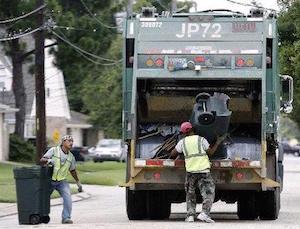A-901 Solid Waste Transportation Compliance
A-901 Solid Waste Transportation Compliance

Our attorneys represent and advise solid waste transporters. New Jersey’s waste industry is highly regulated and monitored. Our attorneys assist with providing transportation businesses with comprehensive advice and guidance to ensure compliance with applicable rules and requirements.
Regulation and Enforcement
The New Jersey Department of Environmental Protection (“NJDEP”) regulates, monitors, and enforces a wide range of environmental protection and conservation laws throughout the State of New Jersey. Waste transportation and disposal is one of the major areas which the NJDEP monitors with numerous goals, including eliminating illegal dumping (and thus land and water pollution), eradicating criminal activity from the waste removal industry due to a historic connection between the industry and illegal conduct, and educating waste handlers about relevant solid waste laws, rules and environmental impacts.
THE NJDEP handles A-901 licensing (the license required for waste transporters), CPCN (Certificate of Public Convenience and Necessity) registration, and waste vehicle registrations for vehicle and equipment decals and identification.
While the NJDEP is the primary regulatory agency overseeing appropriate waste transportation and disposal, it is not the only organization responsible for this. Most New Jersey counties have their own local enforcement agencies, such as the HCIA (Hudson County Improvement Authority) in Hudson County and the MCMUA (Morris County Municipal Utilities Authority in Morris County. Each County may have its own specific requirements regarding waste flow (i.e. the type of garbage or waste being disposed of and where it may be disposed).
Other agencies may also have a say in a waste transporter’s business operations. For instance the USDOT (Unites States Department of Transportation) may require registration with the FMCSA (Federal Motor Carrier Safety Administration) for interstate travel.
A solid waste business’s vehicles will likely need to be registered as “commercial” with New Jersey’s Motor Vehicle Commission, as well as complying with other MVC and NJDOT travel requirements, as well as county route restrictions in some cases.
Hazardous waste has more stringent compliance requirements and may also need to register with the United States Environmental Protection Agency and comply with its additional requirements for hazardous waste.
Any of these agencies may cite rule violations. Therefore, it is important to be in compliance with the regulations of all agencies.
A-901 Licensing
The New Jersey Legislature and the NJDEP have enacted numerous rules, regulations, and reporting requirements for waste transporters. The first step for waste transporters – before engaging in any waste transportation at all – is to apply for an A-901 license.
The application process is not quick or easy. It is sometimes even considered intrusive because of the amount of personal information required to be submitted by all key personnel of a waste transportation business. Required information includes the source of funding for the business, business locations, lease and lessor information, identification of owners and key employees, etc. Then every key employee, owner, partner, officer, director, and managing member must complete a disclosure form which requires a great deal of specific and detailed information such as information regarding family members, employment history, and other personal details. Moreover, each of these people need to be fingerprinted and have background checks conducted. The process of obtaining an A-901 alone generally takes about a year.
Indeed, the application itself can be quite lengthy and involved depending on the number of key employees and owners, and the number of associated businesses. For instance if the waste transporter business is owned by another business, that parent company must complete its own business disclosure and so on. One of the goals of this is to avoid “shell” corporations and allow the NJDEP to ascertain exactly who will actually have a say in the company’s operations.
Beyond the A-901
The A-901 is not the end of the process for bringing a waste transportation company into compliance; it is just the beginning. Oftentimes the owner(s) of a new waste transportation business may have no prior experience in the industry. In that case, the NJDEP may require the owner(s) to consult with a solid waste attorney to become familiar with the relevant laws and requirements on top of attending a workshop run by the NJDEP itself. The attorney or consultant is then required to submit a letter to the NJDEP confirming that he or she had advised the business of its compliance obligations.
A New Jersey solid waste transportation business’s further compliance obligations may vary based upon what kind of waste is being transported. Most solid waste transportation businesses (but not all) will also need to apply for a Certificate of Public Convenience and Necessity “(CPCN”) and provide a variety of information, such as what rates are expected to be charged to future customers.
Then most (but not all) solid waste transportation businesses in New Jersey will have to apply to obtain decals (identifying stickers) for their waste collection vehicles and equipment. Incorrect markings and decal placement on vehicles are some of the most often cited violations for waste transporters because it is the most visible error which enforcement officials and inspectors may observe.
A waste transporter’s reporting requirements are never over. A company must file yearly (or for decals, biennial) reporting updates to the NJDEP. Also, businesses need to advise the NJDEP of any changes in business information as soon as possible (generally within 30 days) so that information can be updated in the system and fines and penalties can be avoided.
Contact Us
McLaughlin & Nardi, LLC’s attorneys can assist with all or any level of the application or compliance process, including general advice and consultation services. To obtain assistance, please email us or call (973) 890-0004.

